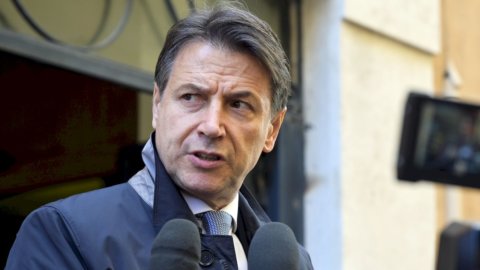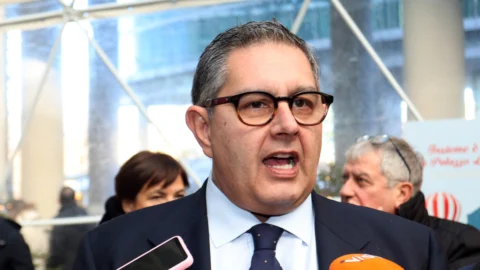A united front to react to the crisis. The Italian premier Giuseppe Conte, together with eight other European leaders, wrote a joint letter addressed to the European Council scheduled for tomorrow, March 26, to ask for the creation of coronabonds to deal with the economic crisis caused by the coronavirus emergency.
In addition to Conte, the letter was signed by Emmanuel Macron, President of the Francia, Pedro Sánchez, Prime Minister of the Spain, Sophie Wilmès, Prime Minister of Belgium, Kyriakos Mitsotakis, Prime Minister of Greece, Leo Varadkar, Prime Minister ofIreland, Xavier Bettel, Prime Minister of Luxembourg, António Costa, Prime Minister of Portugal and Janez Janša, Prime Minister of Slovenia.
“The emergency we are experiencing knows no borders – explained the Prime Minister in a Facebook post – It is an unprecedented shock that requires exceptional response measures, necessary not only to contain the spread of the infection, but also to stem the negative effects produced on the socio-economic fabric. At European level there is a need to standardize health practices and to increase the exchange of information, especially now, in the most acute phase of the epidemic. The European response, also on an economic-financial level, must be powerful, cohesive and timely. To pursue these goals, I wrote a letter to the President of the European Council, Charles Michel, together with the leaders of Belgium, France, Greece, Ireland, Luxembourg, Portugal, Slovenia and Spain".
The hypothesis of launching coronabonds (or eurobonds), i.e. government bonds issued by the EU, was also discussed during theEurogroup of 24 March, however encountering the resistance of the Northern countries, including Germany, even if Chancellor Merkel could reserve surprises (perhaps more on the use of the Mes than on Coronabonds). On the other hand, the president of the ECB is in favor of the new instruments Christine Lagarde, who urged ministers to consider creating Coronabonds as a “one-off”, to help the eurozone economy. In fact, according to Lagarde, the use of the MES Enhanced Conditions Credit Line (ECCL) represents only a first step that would need to be supported by other initiatives, including coronabonds. In view of the European Council scheduled for tomorrow, the issue is therefore returning to the center of the community debate.
The following the full text of the letter sent by the nine European leaders to Charles Michel, President of the European Council:
Dear President, dear Charles
the Coronavirus pandemic is an unprecedented shock and requires exceptional measures to contain the spread of the infection within national borders and between countries, to strengthen our health systems, to safeguard the production and distribution of essential goods and services and, last but not least, to limit the negative effects that the shock produces on European economies.
All European countries have taken or are taking measures to contain the spread of the virus. Their success will depend on the timing, extent and coordination with which the various Governments implement the sanitary containment measures.
We need to align practices across Europe, building on successful past experiences, expert analyses, the overall exchange of information. It is needed now, in the most acute phase of the epidemic. The coordination that you have initiated, with Ursula von der Leyen, in video conferences between leaders is helpful in this sense.
It will also be necessary in the future, when we can gradually reduce the severe measures adopted today, avoiding both an excessively rapid return to normality and the return of contagion from other countries. We must ask the European Commission to develop shared guidelines, a common basis for the collection and sharing of medical and epidemiological information, and a strategy to deal with the unsynchronized development of the pandemic in the near future.
While we implement unprecedented socio-economic measures, which impose an unprecedented slowdown in economic activity, we still need to ensure the production and distribution of essential goods and services, and the free movement of vital medical devices within the EU. Preserving the functioning of the single market is crucial to providing all European citizens with the best possible care and the broadest assurance that there will be no shortages of any kind.
We are therefore committed to keeping our internal borders open to the necessary exchange of goods, information and the essential movements of our citizens, especially those of cross-border workers. We also need to ensure that key value chains can fully function within EU borders and that no strategic manufacturing falls prey to hostile takeovers in this tough economic time. Our efforts will be primarily aimed at ensuring the production and distribution of medical equipment and essential protective devices, to make them available, at affordable prices and in a timely manner to those who need them most.
The extraordinary measures we are taking to contain the virus have a negative impact on our economies in the short term. We therefore need to take extraordinary actions that limit the economic damage and prepare us for the next steps. This global crisis requires a coordinated response at European level. The ECB announced on Thursday 19 March a series of unprecedented measures which, together with the decisions taken the week before, will support the Euro and stem financial tensions.
The European Commission has also announced a comprehensive set of actions to ensure that the tax measures that Member States have to adopt are not hampered by the rules of the Stability and Growth Pact and by state aid legislation. Furthermore, the Commission and the European Investment Bank (EIB) have announced a package of policies that will allow member states to use all available resources from the EU budget and to benefit from EIB tools to fight the epidemic and its consequences.
Member States will have to play their part and ensure that as few people as possible lose their jobs due to the temporary closure of entire sectors of the economy, that as few businesses go bankrupt, that liquidity keeps flowing into the economy and that banks continue to lend despite payment delays and increased riskiness. All of this requires unprecedented resources and a regulatory approach that protects jobs and financial stability.
The ECB's monetary policy tools will therefore need to be complemented by similarly bold fiscal policy decisions, such as the ones we have begun to take, backed by clear and resolute messages from us as leaders in the European Council.
We must recognize the seriousness of the situation and the need for a further reaction to strengthen our economies today, in order to put them in the best conditions for a rapid recovery tomorrow. This requires the activation of all common fiscal tools to support national efforts and to guarantee financial solidarity, especially in the Eurozone.
In particular, we need to work on a common debt instrument issued by an EU institution to raise resources on the market on the same basis and for the benefit of all Member States, thus ensuring the stable and long-term financing of policies useful for countering damage caused by this pandemic.
There are good reasons to support such a common instrument, as we are all facing an exogenous symmetrical shock, for which no country is responsible, but whose negative consequences affect all. And we must collectively account for an effective and united European response. This common debt instrument will need to be large enough and long-term to be fully effective and to avoid refinancing risks now and in the future.
The funds raised will be used to finance, in all Member States, the necessary investments in health systems and temporary policies aimed at protecting our economies and our social model.
In the same spirit of efficiency and solidarity, we will be able to explore other instruments within the EU budget, such as a specific fund for expenditure related to the fight against the Coronavirus, at least for the years 2020 and 2021, beyond those already announced by the Commission.
By giving a clear message of wanting to face this unique shock all together, we would strengthen the Economic and Monetary Union and, above all, we would send a very strong signal to our citizens about the determined and resolute cooperation with which the European Union is committed to providing an answer effective and unitary.
We also need to prepare 'the next day' together and reflect on how we organize our economies across our borders, global value chains, strategic sectors, health systems, joint investments and European projects.
If we want the Europe of tomorrow to live up to its historic aspirations, we must act today and prepare for our common future. Let us therefore open the debate now and move forward, without hesitation.





